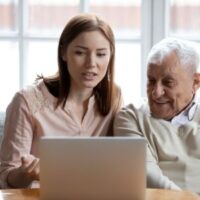Category Archives: Senior Services

Common Estate Planning Mistakes and How to Avoid Them
Estate planning is of vital importance even for the young. It’s something everyone should do to protect themselves while they are still alive. It ensures your assets are distributed according to your wishes after your death and it will prevent your family from fighting over your estate. You never know when you’re going to… Read More »

Can Learning a Second Language Help Slow the Progression of Alzheimer’s?
Alzheimer’s disease is a neurodegenerative disorder characterized by cognitive decline and damaged cognitive abilities. Biologically, it can be seen through the buildup of harmful proteins and brain atrophy. However, a recent study published in the journal Bilingualism: Language and Cognition revealed a factor that may inhibit the decline brought about by Alzheimer’s disease and… Read More »

Five Advantages of Establishing a Living Trust in Virginia Beach
Living trusts are an estate planning tool that provide several advantages over wills. In this article, the Law Office of Angela N. Manz will discuss the top five advantages of living trusts and how they work to protect your assets and safeguard your legacy. #1. Avoiding probate When you die with a will, your… Read More »

What Legal Steps Should I Take Before a Major Surgery?
Here at the Law Office of Angela N. Manz, we help older Virginia Beach residents prepare their estates for possible long-term care needs or even death. Before you go in for a major procedure, you should have your affairs in order in case the worst happens. You don’t want to find yourself in a… Read More »
Tips Offered On Avoiding Loneliness After Retirement
Many people fail to realize, until they retire, that is, just how much of their social interactions is tied to the workplace. “Retirement can be a challenging time, especially when you live far away from your family,” author, speaker and founder of Boomerly.com Margaret Manning wrote in a recent Huffington Post article “Many people… Read More »
Coalition Wants Better Rules Governing Financial Advisors
A number of public interest groups have formed a coalition whose purpose is to protect the interests of retirees. These organizations want the “U.S. Department of Labor to revise rules requiring financial advisers to act in their clients’ best interests when offering retirement investment advice,” according to a recent story by Carole Fleck on… Read More »
Devices Make It Easier To Monitor Mom And Dad’s Activities
When adult children live far from their older parents, they’re likely worried about how active mom or dad is being. As the saying increasingly goes, there’s an app for that. “Technology is making it easier for us to monitor our loved ones,” according to a recent story in The Washington Post by Matt McFarland…. Read More »
Half of seniors eligible for drug benefit don’t apply
A little Extra Help could do senior citizens a world of good, literally and figuratively. That’s the name for a Medicare benefit that can greatly help low-income elderly people pay for their prescriptions, but one that far too many of those eligible for it don’t know exists. “More than 2 million people on Medicare… Read More »
Helping Seniors Simple and Worthwhile
It’s something most Americans take for granted: we need something, so we go get it, whether it’s groceries or clothing or what have you, and go back home. But it’s not that simple for people who are homebound. They must depend upon the kindness of others, in some cases strangers, for the basic necessities…. Read More »
